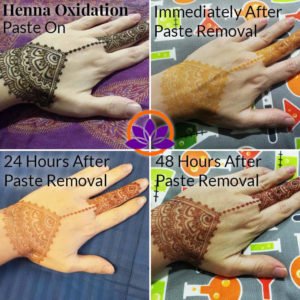Your henna tattoo may appear orange due to the quality of henna powder used or the application process. Factors like moisture level, skin pH, and aftercare also affect the color.
Having an orange henna tattoo can be concerning, but understanding the reasons behind it can help you address the issue. Several factors contribute to the orange hue such as the quality of the henna powder used, the application process, moisture level, skin pH, and aftercare.
By delving into these aspects, you can gain insights into why your henna tattoo turned orange and take appropriate steps to prevent it in the future.
Contents
Understanding Henna Tattoos
If your henna tattoo turns out orange, it could be due to the natural color variations in henna paste or improper application. The dye’s stain develops over time and will likely darken to a reddish-brown hue. It’s best to wait before judging the final color outcome.
Understanding Henna Tattoos
Henna tattoos have been a cultural and artistic tradition for centuries, but if you’ve ever had a henna tattoo turn out orange instead of the expected deep brown, you might wonder why. In this article, we’ll explore the ins and outs of henna tattoos, from their natural properties to their cultural significance. Let’s delve into the world of henna tattoos and unravel the mystery of why your henna tattoo may have turned out orange.
What Is Henna?
Henna, scientifically known as Lawsonia inermis, is a flowering plant with leaves that contain a natural dye called lawsone. This natural dye has been used for centuries to create temporary body art and hair dyes. When henna paste is applied to the skin, it penetrates the top layers and stains it, creating intricate designs that last for a few weeks. The use of henna for body art has its origins in ancient Egypt and has since spread to various cultures around the world.
Natural Properties Of Henna
The orange hue of some henna tattoos can be attributed to the natural properties of henna. The intensity and color of the henna stain depend on various factors such as the quality of the henna powder used, the freshness of the henna paste, and the individual’s skin chemistry. Additionally, the time the henna paste is left on the skin and the aftercare also influence the final color. It is essential to use high-quality, natural henna powder without any additives or chemical dyes to achieve the desired deep brown or reddish-brown color.
Cultural Significance Of Henna Tattoos
Henna tattoos hold significant cultural and ceremonial importance in many societies. Across India, Pakistan, and the Middle East, henna is traditionally applied during weddings, festivals, and other celebrations as a symbol of joy, beauty, and protection. These intricate designs are thought to bring luck and ward off evil spirits, making them an essential part of cultural heritage and rituals.
Overall, understanding the natural properties and cultural significance of henna tattoos plays a crucial role in achieving the desired results. By using high-quality, natural henna and respecting the cultural traditions behind its application, you can ensure that your henna tattoos will exude a rich, deep brown color, embodying the beauty and tradition of this ancient art form.
The Science Behind Henna Coloring
Henna, a natural dye derived from the Lawsonia inermis plant, has been used for centuries to create intricate and beautiful body art. However, if you’ve ever ended up with an orange henna tattoo when you were expecting a dark brown stain, you may wonder what causes this unexpected result.
Factors Affecting Henna Color
Several factors can influence the color of your henna tattoo, including the quality of the henna powder, the pH levels of the paste, and the duration of the dye release. Understanding these factors can help you achieve the desired henna color.
Quality Of Henna Powder
The quality of the henna powder plays a crucial role in determining the resulting color of your henna tattoo. Fresh, pure henna powder, free from additives or dyes, is more likely to produce a rich, dark stain. Old or low-quality henna powder can result in an orange or dull color due to the lack of lawsone, the pigment responsible for staining the skin.
Ph Levels And Henna Color
The pH levels of the henna paste can impact the color outcome. An acidic environment helps release the lawsone pigment, resulting in a deeper, darker stain. On the other hand, high pH levels can lead to an orange or lighter color. Maintaining a balanced pH during the henna paste preparation is essential for achieving the desired hue.
Potential Causes Of Orange Henna Tattoos
Impurities In Henna Paste
Impurities in henna paste can lead to a variation in color, turning the tattoo orange. If the henna paste contains metallic salts or other contaminants, it can alter the natural color of the henna, resulting in an orange hue instead of the desired deep, rich tone.
Additives And Dyes
Henna mixtures that contain additives and synthetic dyes can produce unexpected color results. Some henna pastes are blended with artificial ingredients to achieve specific shades, which may lead to an orange tint if the additives react unexpectedly with the natural henna pigment.
Oxidation Process And Henna Color
When henna is exposed to air and allowed to oxidize, its color intensifies. However, if the oxidation process is not controlled or if the henna paste is not properly prepared, it can result in an orange hue instead of the intended reddish-brown color. This can occur when the henna paste is not left on the skin for the appropriate amount of time.
Allergic Reactions To Henna
Some individuals may experience allergic reactions to henna, which can manifest as skin irritation or discoloration. Allergic responses can cause the henna tattoo to appear orange due to the body’s inflammatory response, altering the normal coloring process.
Preventing And Fixing Orange Henna Tattoos
If you’ve experienced an orange tint after applying a henna tattoo, you’re not alone. There are several reasons why henna tattoos may turn orange, including low-quality henna, improper application, or not giving it enough time to develop. Fortunately, there are steps you can take to prevent and fix this issue. From choosing high-quality henna to natural remedies for color correction, here are some tips to ensure a beautiful, natural-looking henna tattoo.
Tips For Choosing High-quality Henna
When selecting henna for your tattoo, look for products that are 100% natural and free from added dyes or chemicals. High-quality henna should have a vibrant, greenish-brown color, indicating that it’s fresh and pure. Additionally, check the ingredients list to ensure there are no artificial additives that could alter the color.
Testing Henna On A Small Area
Before applying henna to a larger area, it’s essential to perform a patch test on a small area of your skin. This will help you determine the quality of the henna and whether it’s likely to produce an orange hue. If the henna consistency is gritty or the color looks off, it’s best to avoid using it for your tattoo.
Correcting Undesirable Henna Color
If your henna tattoo turns out orange, there are steps you can take to correct the color. One method is to exfoliate the skin gently with a sugar scrub or a mixture of lemon juice and sugar. This can help lighten the color, making it less prominent. However, be cautious not to over-exfoliate, as this can cause irritation.
Natural Remedies For Color Correction
If you prefer natural remedies, you can try applying a paste of baking soda and lemon juice to the affected area. The alkaline nature of baking soda combined with the citric acid in lemon juice may help neutralize the orange tones. Leave the paste on for a few minutes, then rinse it off gently with lukewarm water.

Frequently Asked Questions
Why Does My Henna Tattoo Turn Orange?
Henna paste oxidizes over time, causing the stain to darken and may appear orange initially.
What Factors Can Cause My Henna Tattoo To Appear Orange?
The quality of henna powder, mixing with certain oils, or skin pH levels may affect the color.
Can I Prevent My Henna Tattoo From Turning Orange?
Use high-quality henna powder, make sure the paste is properly mixed, and practice good aftercare.
How Long Does It Take For A Henna Tattoo To Turn Orange?
The color change can occur within the first 24 hours after the paste is removed.
Is It Normal For A Henna Tattoo To Look Orange At First?
Yes, the stain will deepen to a rich, reddish-brown color within 48 hours of application.
Conclusion
If you’re finding that your henna tattoo looks orange, don’t worry – it’s not uncommon. Understanding why this happens and how to prevent it can help you achieve the perfect henna color. By using high-quality henna and following proper application techniques, you can enjoy a beautiful and rich henna tattoo that reflects your personal style and beauty.





